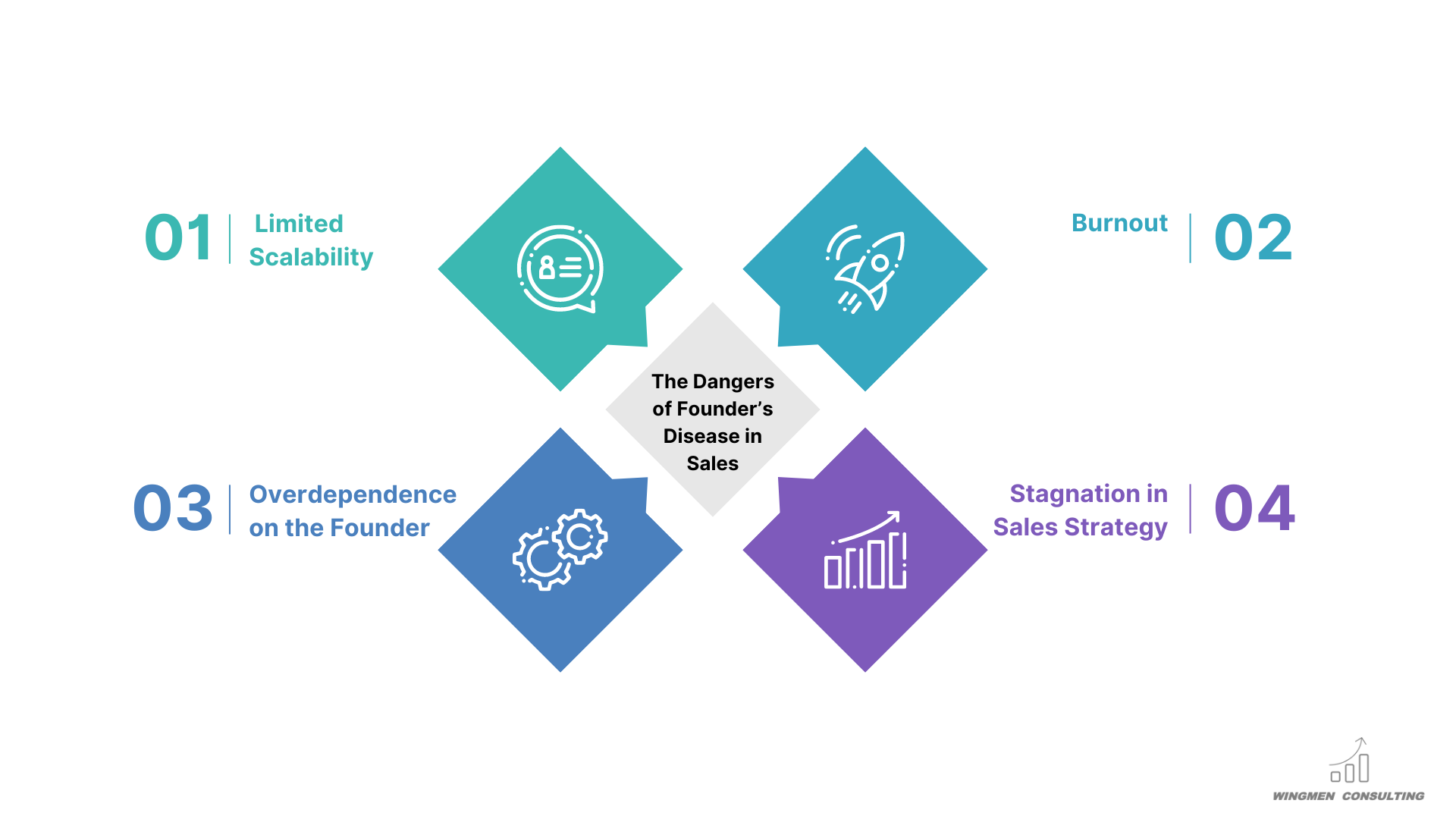Founder’s Disease in Sales: A Barrier to Sustainable Business Growth
As an entrepreneur, your passion and dedication have been the driving forces behind your business’s success. You’ve been involved in every aspect, from product development to customer service. However, there’s a common trap that many founders fall into, particularly when it comes to sales. This is known as Founder’s Disease. In the context of sales, Founder’s Disease can significantly hinder your business’s growth and sustainability. Understanding and addressing this issue is crucial for creating a scalable and thriving enterprise.
The Role of the Founder in Sales
When you first start your business, it’s natural to take on the primary sales role. As the founder, you know your product or service inside out. Your passion and knowledge make you the best salesperson for your company. This direct involvement can lead to initial success and establish a strong foundation for customer relationships. However, as your business grows, continuing to be the primary salesperson can become a major bottleneck.
The Dangers of Founder’s Disease in Sales
1. Limited Scalability
One of the most significant issues with Founder’s Disease in sales is the limitation it places on scalability. There are only so many hours in a day, and if the founder is the main salesperson, the business’s growth is directly tied to the founder’s availability and energy levels. This can severely restrict the potential for expansion.
2. Overdependence on the Founder
When the founder is heavily involved in sales, the entire sales process can become overly dependent on their presence. This can create a significant risk for the business if the founder is unavailable due to illness, personal reasons, or other commitments. It can also lead to customer dissatisfaction if they expect a level of service that only the founder can provide.
3. Burnout
The demands of being the primary salesperson can lead to burnout. Balancing sales responsibilities with other critical business functions can be exhausting and unsustainable in the long run. This can impact the founder’s health and well-being, as well as the overall performance of the business.
4. Stagnation in Sales Strategy
Founders often have a particular way of selling that has worked for them. However, this approach might not be the most effective as the market evolves. Being stuck in a single sales strategy can prevent the business from adapting to new trends and customer behaviours.

Strategies to Overcome Founder’s Disease in Sales
1. Building a Sales Team
The first step to overcoming Founder’s Disease in sales is to build a dedicated sales team. Hiring experienced sales professionals can help distribute the workload and bring fresh perspectives to your sales strategy. Invest time in training and onboarding your sales team to ensure they understand your product, values, and customer base.
2. Creating a Sales Process
Develop a standardised sales process that can be replicated by your sales team. This process should include lead generation, qualification, pitching, follow-up, and closing techniques. Documenting this process ensures consistency and allows new team members to get up to speed quickly.
3. Empowering Your Team
Empower your sales team by giving them the autonomy to make decisions and close deals. Trusting your team to handle sales independently will not only free up your time but also boost their confidence and motivation. Encourage them to develop their unique sales styles within the framework of your overall strategy.
4. Leveraging Technology
Utilize sales automation tools and Customer Relationship Management (CRM) systems to streamline sales processes. These tools can help track leads, manage customer interactions, and analyse sales data, enabling your team to work more efficiently and effectively.
5. Continuous Training and Development
Sales techniques and market conditions are constantly evolving. Provide ongoing training and development opportunities for your sales team to keep them updated with the latest trends and best practices. This can include workshops, seminars, online courses, and mentorship programs.
6. Setting Clear Goals and Metrics
Establish clear sales goals and performance metrics for your team. Regularly review these metrics to assess the effectiveness of your sales strategies and make data-driven decisions. Recognise and reward high performers to foster a competitive and motivated sales culture.
The Benefits of Overcoming Founder’s Disease in Sales
Increased Scalability
By building a strong sales team and developing standardised processes, your business can scale more effectively. The sales function will no longer be limited by the founder’s availability, allowing for sustained growth and expansion.
Enhanced Customer Experience
A dedicated sales team can provide more personalised and consistent customer interactions. This can lead to higher customer satisfaction and loyalty, as clients receive prompt and professional service from a knowledgeable team.
Founder’s Focus on Strategic Growth
Delegating sales responsibilities allows the founder to focus on strategic initiatives, such as product development, market expansion, and building partnerships. This shift from operational to strategic involvement is crucial for long-term business success.
Business Resilience
A well-trained and autonomous sales team makes the business more resilient to unforeseen challenges. The company is less vulnerable to disruptions caused by the founder’s absence or burnout, ensuring continuity and stability.
Conclusion
Founder’s Disease in sales is a common obstacle to many entrepreneurs. While the founder’s involvement in sales can drive initial success, it becomes a hindrance to growth and scalability as the business expands. By building a competent sales team, creating standardised processes, and empowering your team, you can overcome this challenge and set your business on a path to sustainable growth. Embracing these strategies not only enhances your sales capabilities but also allows you to focus on strategic priorities, ensuring the long-term success of your business.

